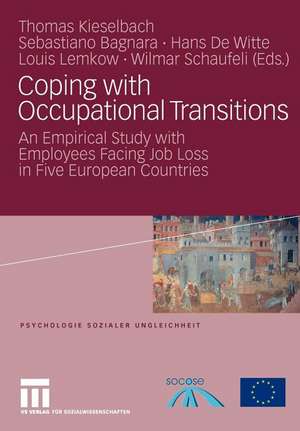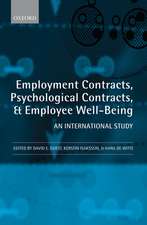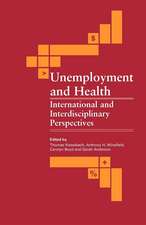Coping with Occupational Transitions: An Empirical Study with Employees Facing Job Loss in Five European Countries: Psychologie sozialer Ungleichheit, cartea 13
Editat de Thomas Kieselbach, Sebastiano Bagnara, Hans De Witte, Louis Lemkow, Wilmar Schaufelide Limba Germană Paperback – 15 iul 2009
Preț: 448.39 lei
Preț vechi: 527.52 lei
-15% Nou
Puncte Express: 673
Preț estimativ în valută:
85.80€ • 89.90$ • 70.93£
85.80€ • 89.90$ • 70.93£
Carte tipărită la comandă
Livrare economică 11-25 aprilie
Preluare comenzi: 021 569.72.76
Specificații
ISBN-13: 9783531152370
ISBN-10: 3531152378
Pagini: 354
Ilustrații: 354 S. 6 Abb.
Dimensiuni: 170 x 240 x 23 mm
Greutate: 0.57 kg
Ediția:2009
Editura: VS Verlag für Sozialwissenschaften
Colecția VS Verlag für Sozialwissenschaften
Seria Psychologie sozialer Ungleichheit
Locul publicării:Wiesbaden, Germany
ISBN-10: 3531152378
Pagini: 354
Ilustrații: 354 S. 6 Abb.
Dimensiuni: 170 x 240 x 23 mm
Greutate: 0.57 kg
Ediția:2009
Editura: VS Verlag für Sozialwissenschaften
Colecția VS Verlag für Sozialwissenschaften
Seria Psychologie sozialer Ungleichheit
Locul publicării:Wiesbaden, Germany
Public țintă
ResearchCuprins
Comparative Report WP 2.- Job insecurity and successful re-employment: Experiences in five European countries.- National Reports.- Job insecurity and successful re-employment: Examples from Belgium.- Job insecurity and successful re-employment: Examples from Germany.- Job insecurity and successful re-employment: Examples from The Netherlands.- Job insecurity and successful re-employment: Examples from Italy.- Job insecurity and successful re-employment: Examples from Spain.
Notă biografică
Prof. Dr. Thomas Kieselbach is professor of Work and Health Psychology, head of the Institute for Psychology of Work, Unemployment and Health (IPG) at the University of Bremen (Germany) and member of the board of the International Commission on Occupational Health (ICOH).
Prof. Dr. Sebastiano Bagnara is professor of Psychology at the Department of Architecture and Urban Planning at the University of Sassari at Alghero (Italy) and past general secretary of the International Ergonomics Association (IEA).
Prof. Dr. Hans De Witte is professor of Work Psychology at the Department of Psychology (Research Group Work, Organisational & Personnel Psychology, WOPP) at the Katholieke Universiteit Leuven (Belgium).
Prof. Dr. Louis Lemkow is professor of Sociology at the Universitat Autònoma de Barcelona (Spain) and director of the Institute of Environmental Sciences and Technology also at the UAB.
Prof. Dr. Wilmar Schaufeli is professor of Work and Organizational Psychology and director of the Research Institute Psychology and Health at the Universiteit Utrecht (The Netherlands).
Prof. Dr. Sebastiano Bagnara is professor of Psychology at the Department of Architecture and Urban Planning at the University of Sassari at Alghero (Italy) and past general secretary of the International Ergonomics Association (IEA).
Prof. Dr. Hans De Witte is professor of Work Psychology at the Department of Psychology (Research Group Work, Organisational & Personnel Psychology, WOPP) at the Katholieke Universiteit Leuven (Belgium).
Prof. Dr. Louis Lemkow is professor of Sociology at the Universitat Autònoma de Barcelona (Spain) and director of the Institute of Environmental Sciences and Technology also at the UAB.
Prof. Dr. Wilmar Schaufeli is professor of Work and Organizational Psychology and director of the Research Institute Psychology and Health at the Universiteit Utrecht (The Netherlands).
Textul de pe ultima copertă
This volume assembles the main results of the EU research project "Social Convoy and Sustainable Employability: Innovative Strategies for Outplacement/Replacement Counselling" (SOCOSE) supported by GD Research of the European Commission (FP 5) in the programme "Improving the Socio-Economic Knowledge Base". The project was co-ordinated by Thomas Kieselbach from the University of Bremen.
The project is based on interdisciplinary research from five countries (Belgium, Germany, Italy, Spain, and The Netherlands), in which psychologists and social scientists analysed approaches of occupational transition counselling in the sense of a "social convoy" in the course of dismissal until successful reintegration into the labour market. The empirical research is based primarily on interviews with 250 employees who were affected by changing work environments ("insecure jobs") or who had previously lost their jobs and had found new employment through the help of outplacement/ replacement counselling ("successfully reemployed"). They were questioned with regard to their experiences, expectations and evaluation of the transition period also under the perspective of experienced injustices.
For each country innovative cases of good practice are analyzed where social actors joined in order to cope with redundancy, where specific strategies were developed, e. g. targeting vulnerable groups, or where employers expressed their social responsibility towards dismissed employees in a way that could set an example for the European debate.
The project is based on interdisciplinary research from five countries (Belgium, Germany, Italy, Spain, and The Netherlands), in which psychologists and social scientists analysed approaches of occupational transition counselling in the sense of a "social convoy" in the course of dismissal until successful reintegration into the labour market. The empirical research is based primarily on interviews with 250 employees who were affected by changing work environments ("insecure jobs") or who had previously lost their jobs and had found new employment through the help of outplacement/ replacement counselling ("successfully reemployed"). They were questioned with regard to their experiences, expectations and evaluation of the transition period also under the perspective of experienced injustices.
For each country innovative cases of good practice are analyzed where social actors joined in order to cope with redundancy, where specific strategies were developed, e. g. targeting vulnerable groups, or where employers expressed their social responsibility towards dismissed employees in a way that could set an example for the European debate.
Caracteristici
An empirical study with employees facing job loss in five European countries























